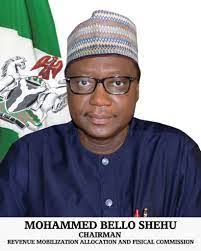
In this interview, the Chairman of the Revenue Mobilization, Allocation and Fiscal Commission (RMAFC), Mohammed Shehu, defends plans for upward review of emoluments of the President, Governors and political office holders which has been interpreted in many quarters to mean ‘jumbo pay’. Shehu also speaks on some other issues of national importance. Excerpts:
Some Nigerians mistake the functions of your Commission for that of the Salaries and Wages Commission. For the benefit of such people, what are the functions of the Revenue Mobilization, Allocation and Fiscal Commission?
We are an agency of the Federal Government of Nigeria that oversees the revenues accruing to and the disbursement of such funds from the Federation Account to the federal, states and local government areas. We also ensure that there is conformity and equity in the nation’s revenue allocation formula. We are empowered by law to, among other things, determine the remuneration of political office holders such as the President, Vice President, Governors, Deputy Governors, Senators, members of the House of Representatives, Ministers and Heads of Federal Government agencies like Directors General as well as judicial officers. We also perform other functions such as advising states on how to improve their sources of revenues. We are also empowered to look into the revenue profiles of the Nigerian National Petroleum Corporation (NNPC), the Nigerian Customs Service and the Federal Inland Revenue Service, the Central Bank of Nigeria, the Ministry of Finance and all other revenue generating agencies of government. We don’t just look at their books, we also look to see whether they remit the revenues they generate into the Federation Account as required by law. We also perform other functions assigned to us from time to time by the executive and the legislature.
Only recently, your Commission is said to have increased the emoluments of political office holders. Is this justifiable considering the hue and cry by citizens that these categories of officers are already over paid?
First, let us clear a misconception. No Minister of the Federal Republic of Nigeria earns more than N1, 000, 000 a month. If you put that together, all 48 of them do not earn a cumulative N50, 000, 000 a monthly. Multiply that by 12 months which totals N600, 000 annually; multiply by four years that gives you N2.4bn in four years. This amount represents what they are paid as salaries and allowances including what they pay their personal staff, housing and all. If you look at their salaries as Ministers it ranges between two hundred and four hundred thousand Naira. What makes the amount up to about N1 million are the housing, personal staff salaries/allowances. If you recall, not too long ago, once a person was appointed Minister, he was given accommodation, [b]a cook, a driver and a fleet of cars. This was under the former arrangement but by 2007 to 2008, a new policy changed all that. It was agreed that these things be monetized. During the President Muhammadu Buhari administration, I knew of a serving Minister who lived in Karu, a suburb of Abuja, because he could not afford to pay the rent in the City Centre. Furniture allowance is paid out once in four years and once you’ve finished serving, you are paid a severance package once which is not more than N6 million. Even the President, after four years, his severance package is not more than N12 million. What I said before is that I know public servants who after serving for four or five years they could receive up to N500 million or more as severance package. Some officers in the National Communications Commission, Central Bank of Nigeria especially some of the Deputy Governors that were recently retired are going to receive packages that will surprise Nigerians. This is not to talk of those who are in the NNPC[/b]. This is why I am saying an increase in the emoluments of political office holders and judicial officers among others are not emoluments that should attract public anger.
Besides, the last time we made an increase for this category of public servants was 2008.
Why is this so?
Well, it is the situation with the economy and the matter wasn’t really looked into and because of the way the Nigerian Labour Congress and human rights groups were looking at it. People go with the erroneous belief that political office holders are overpaid, it is not true. Now, look at Supreme Court Justices who receive a little over one million monthly. The President’s salary is not up to one million five hundred Naira monthly, that is the law. This includes his salary and allowances, the same applies to the Vice President, the same applies to Governors and their deputies, senators, members of the House of Representatives and their counterparts in state assemblies. But I want Nigerians to understand that the salary paid to legislators is not up to one million naira monthly but they have what they call running costs. RMAFC is not involved in the disbursement of these funds because it is unknown to the law establishing our Commission. They are the ones who allocate these funds to themselves using their legislative powers. We hear some of them receive sums of up to N10 million but they are saying they don’t put it in their pockets but use to run their offices in their various constituencies. Take for instance, you are representing Kaduna North as senator, take a look at Zaria. Zaria is a big place, you have like seven local government areas in Kaduna North, you are required to have offices in Zaria, Ikara, Soba, Kudan, Makarfi, and other places, you will recruit staff, buy office equipment, pay security men and others. They retire such funds in accordance with the law. But in other countries of the world, this is different. In Indonesia, Malaysia and to some extent India, even though India operates the parliamentary system, even in America, legislators don’t have a business running constituency offices in this manner as senators or congressmen. They have a system where offices are built and staffed in the various constituencies and these staff members work whether or not a particular congressman wins or loses an election, the constituency office belongs to the constituency irrespective of who occupies the office as elected official. Staff members of these offices are paid by the Senate or Congress as the case may be without the congressman receiving these funds on their behalf. If Nigerians are to apply pressure for this system to be brought to Nigeria things will be done differently. The offices can be permanent and the occupants can differ.
Where do our lawmakers get these funds from?
You see, under a democratic setting, there is what is called separation of powers. You have the executive, the legislature and the judiciary. These arms exist to provide checks and balances in order to prevent the concentration of these powers in the hands of a single individual. The legislators will tell you they represent the people at all levels, and, as such, when the executive comes with a proposal to spend X amount of money, they can say they are in the legislature as representatives of the people and so this is what they want to spend. If the executive decides to oppose this, it could lead to a shutdown of government as you see in the United States of America every now and then. Government could be shut down for a week or two before the matter is resolved. You find a situation like “if you don’t do such for us, we will not do such for you”. This is how democracy is, Nigerians should be patient unless they want to see things done differently; they can approach our lawmakers and push for a change.
Why is there a wide gap in the emoluments of political office holders and public servants in some agencies and parastatals such as the CBN, NCC, NNPC and the like?
Well, for us in RMAFC, our statutory responsibility is the category of public officers I mentioned earlier. There is a separate agency which is the Salaries and Wages Commission. It is responsible for the salaries of other categories of public servants and those working in the places you mentioned. When some of these agencies were established, the nature of the services they rendered was taken into account. It was decided that staff most of whom are specialists should be remunerated in such a way as to retain their services. The CBN for example oversees the fiscal policies of government. It was during the tenure of former CBN Governor, later Emir of Kano, Sanusi II, that some of these adjustments were made to improve the workings of the CBN; this was done with the understanding of the executive and the legislature. I think that was the reason. But let me tell you, in this country today, like the former Minister of Labour, Chris Ngige, said, there are about 17 or 19 different salary structures in Nigeria. Take the Ministry of Finance for instance, a Director in the Ministry earns a little over N400, 000 monthly as salary but his counterpart in the CBN earns between one and two million Naira monthly.
When is the new salary structure for political office holders expected to come into effect?
We are not looking at that at the moment because of the current economic situation in our country. A new President has just taken over, he removed fuel subsidies and all citizens are going through a lot trying to adjust. And government is looking for ways to provide palliatives for Nigerians, the Nigerian Labour Congress is threatening to go on strike and they are also demanding increased salaries. We have no choice but to put any planned increase for political office holders on hold. We are Nigerians and we are sensitive to all that is happening. We have to wait to see what government will do in terms of adjustments. When the necessary adjustments are made and revenues improve, then we can consider.
Has your Commission’s proposal for an upward review been approved?
During the last administration, former President Muhammadu Buhari gave us the go ahead to carry out a review of the emoluments of the judicial staff. Some people went to court and got a judgment that judges should be paid N10 million monthly. However, other stakeholders met and came up with a position which was taken to the President, he agreed in principle but referred them to us, and we were working on that when we were told to include that of political office holders. We completed our task but between when our work was completed and the expiration of his tenure were just one or two months. So, there was no time to consider our report. The report has not been implemented. If you recall, some media houses reported that we’ve increased the salaries of President Tinubu and other political office holders, it is not true. Our prayer now is for our economy to improve then we can look at this issue. The last time a review was carried out, the minimum wage was less than N10, 000 monthly. It is the same market all of us go to. We are looking forward to such a time that the economy will improve and more people pay their taxes to improve revenues to enable the government to meet its obligations such as construction of roads, rail tracks, schools and hospitals to improve our lives.




